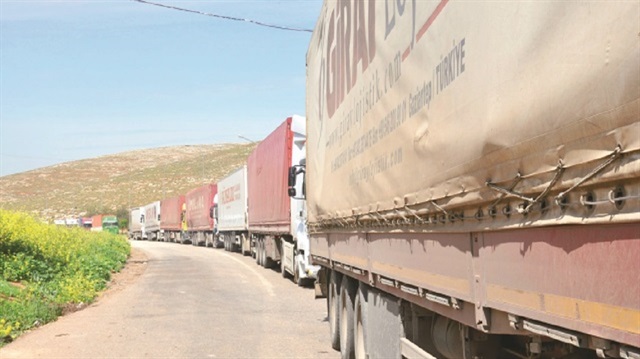
The PKK terrorist organization is thus trying to profit from the closing of the Cilvegözü border crossing by extorting tolls from truck drivers
Terrorists from the Kurdistan Workers’ Party (PKK) have begun extorting tolls from truck drivers after Turkey closed its Cilvegözü border crossing with Syria’s Idlib, following recent infighting among Syrian oppositon factions in the northern province.
Turkey has recently closed off the Cilvegözü border crossing in the southern city of Reyhanlı to trucks carrying shipments other than food and medical supplies, cleaning products and produce, which has considerably decreased the numbers of trucks entering the northern city of Idlib.
As a result, trucks are now forced to travel through PKK-occupied territories of Ayn al-Arab, Aleppo and Azaz, among others, in order to reach Idlib.
The PKK terrorist organization is thus trying to profit from the closing of the Cilvegözü border crossing by extorting tolls from truck drivers by establishing the “Afrin Canton Customs Directorate.”
PKK/PYD terrorists are set to secure a large income from traffic entering Idlib, particularly through the adjacent southern Aelppo regions that are under PKK occupation.
PKK terrorists are extorting $100 per ton from trucks carrying electronic and spare car parts, while they’re charging $50 per ton for domestic appliances.
Tolls extorted by PKK terrorists could reach $1,800 for large truck convoys passing through areas under their occupation.
The northern province of Idlib, which is in serious need of construction material, requires up to 200 trucks of building supplies. Hence, the PKK is set to gain $25,000 daily, and up to $750,000 monthly, in tolls extorted from trucks carrying construction material into Idlib alone.
Taking into account shippments of other supplies entering Idlib, PKK terroists will have secured an income source worth millions of dollars.
The PKK is listed as a terrorist organization by Turkey, the European Union and the United States.
The PKK has been conducting armed violence in the southeastern part of Turkey since 1984. More than 40,000 people, mostly civilians, have been killed in the three-decade long conflict.
Hello, the comments you share on our site are a valuable resource for other users. Please respect other users and different opinions. Do not use rude, offensive, derogatory, or discriminatory language.
The floor is all yours.


















